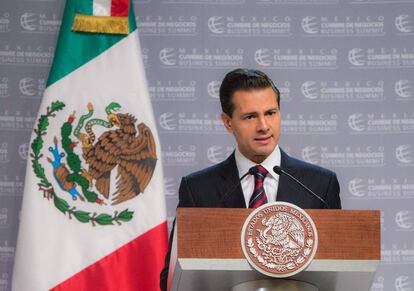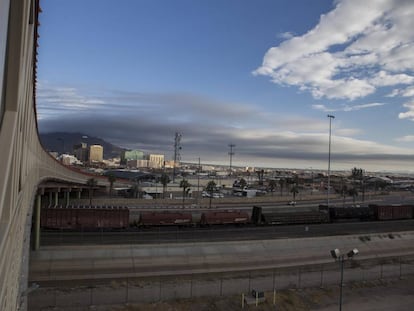Mexico’s economy braces for the chill winds of a Trump administration
The country fears the worst, but will the US president-elect carry out his campaign threats?

Donald Trump’s election win has left Mexico reeling: the stock exchange has hit a record low, as has the peso, prompting the Bank of Mexico to raise interest rates for the third time this year in a bid to shore up the national currency. The threat of Latin America’s second-largest economy entering recession is very real if Trump keeps his campaign promises, says a report by BBVA-Bancomer, Mexico’s largest bank.

Trump has threatened not only to deport millions of undocumented Mexicans and build a wall along the border, but also to tear up the North American Free Trade Agreement (NAFTA) and slap a 35% tax on US companies that outsource to Mexico.
Mexico has reason to be fearful: some 80% of its exports go to the United States, giving it a $100 billion trade surplus with its northern neighbor. With a per capita GDP five times smaller than the United States, exports are the country’s lifeline.
But while cutting trade ties would be devastating for Mexico, it would also hit the United States: Mexico is its second-largest trading partner. Since NAFTA was signed in 1993, the two countries’ economies have become increasingly enmeshed: the difficulties in untangling them has prompted BBVA-Bancomer to say that Trump will find it harder to carry out his threats than his electioneering rhetoric suggests.
Whatever the future holds for Mexico, Trump’s triumph will be felt
“There are reasons to think that the Trump presidency will not adopt the extreme measures he defended during the campaign. In the first place, a high percentage of the products that Mexico exports to the United States are part of a value chain that integrate US input […] and that helps US businesses to be more competitive than those in other areas of the world. Automobiles are the clearest example. Imposing restrictions on exports would be harmful to US producers,” says Bancomer.
Some leading US businesses, such as Ford and General Motors, have already made it clear that they will press ahead with their investment plans in Mexico.
Trump may well find he has little room to reduce trade ties with Mexico, despite his blustery rhetoric, but the BBVA-Bancomer report says that a lot of damage has already been done: “The uncertainty will mean less investment, and therefore a slowdown in employment creation,” it says, pointing out that the depreciation of the peso will drive up inflation and hit the value of salaries, leading to a fall in consumer spending. Interest rates have already risen from 3% to 5.25% this year, while economic growth will be lower than last year, and more spending cuts are expected.
Mexico has reason to be fearful: 80% of its exports go to the United States
“It seems likely that the government will have to make adjustments to the big spending programs it had lined up, because growth will be lower and the deficit and the debt will be bigger, increasing the likelihood that Mexico’s sovereign rating will be lowered and capital will flow out of the country,” says BBVA. Moody’s has already reduced its growth forecast for Mexico for next year from 2.5% to 1.9%.
Recession or downturn, whatever the future holds for Mexico, Trump’s triumph will be felt. And it will have political consequences: 2017 will be President Enrique Peña Nieto’s last full year in office. With an economy in decline and a xenophobe in the White House, politics in Mexico will be radicalized and anti-American feeling will grow, reviving many of the country’s old ghosts. Once again, for all the wrong reasons, the United States will be the main thing on most people’s minds in Mexico.
English version by Nick Lyne.
Tu suscripción se está usando en otro dispositivo
¿Quieres añadir otro usuario a tu suscripción?
Si continúas leyendo en este dispositivo, no se podrá leer en el otro.
FlechaTu suscripción se está usando en otro dispositivo y solo puedes acceder a EL PAÍS desde un dispositivo a la vez.
Si quieres compartir tu cuenta, cambia tu suscripción a la modalidad Premium, así podrás añadir otro usuario. Cada uno accederá con su propia cuenta de email, lo que os permitirá personalizar vuestra experiencia en EL PAÍS.
En el caso de no saber quién está usando tu cuenta, te recomendamos cambiar tu contraseña aquí.
Si decides continuar compartiendo tu cuenta, este mensaje se mostrará en tu dispositivo y en el de la otra persona que está usando tu cuenta de forma indefinida, afectando a tu experiencia de lectura. Puedes consultar aquí los términos y condiciones de la suscripción digital.










































